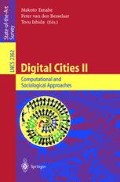Abstract
More and more interfaces are designed for ‘everybody’, instead of with a specific user-group in mind. In practice, most of them are still used by the ‘typical Internet-user’, the highly educated, white young male with extensive computer and Internet-experience. Amsterdam-based digital city DDS is no exception to this rule. In this article, the interface of DDS is studied with the help of ten first-time users with a more diverse background. Did they face any barriers in using DDS? And what kind of work did they need to perform to use the interface? This study shows that the most serious problems the first-time users faced were not caused by a lack of skill, but by the different technological frame they had. Thus, a script-analysis with the help of ‘outsiders’ seems to be an effective way to uncover some exclusion-processes of a digital city.
I would like to thank Ellen van Oost, Sally Wyatt, Anne Sofie Laegran, Nelly Oudshoorn, Agnes Bolso and participants from the Lomskole, the EMTEL-network and three anonymous referees for their helpful comments on earlier versions of this article. I also would like to thank the designers, users and first-time users of DDS who gave me their time and the opportunity to interview them.
Access this chapter
Tax calculation will be finalised at checkout
Purchases are for personal use only
Preview
Unable to display preview. Download preview PDF.
References
Akrich, M., The De-Scription of Technical Objects, in Shaping Technology/Building Society: Studies in Sociotechnical Change, Bijker, W.; Law, J., Editors. 1992, MIT Press: Cambridge. p. 205–224.
Akrich, M., User Representations: Practices, Methods and Sociology, in Managing Technology in Society, The Approach of Constructive Technology Assessment, Rip, A.; Misa, T.J.; Schot, J., Editors. 1995, Prnter Publishers: London, New York. p. 167–184.
Akrich, M.; Latour, B., A Summary of a Convenient Vocabulary for the Semiotics of Human and Nonhuman Assemblies, in Shaping Technology/Building Society, W. Bijker; Law, J., Editors. 1992, MIT Press: Cambridge. p. 259–264.
Van Bastelaer, B.; Lobet-Maris, C., Social Learning regarding Multimedia Developments at a Local Level. The Case of Digital Cities. 1998, University of Namur: SLIM Research, DG XII.
Van den Besselaar, P, I. Melis, D. Beckers, Digital cities: organization, content and use, in Digital Cities: Experiences, Technologies and Future Perspectives, T. Ishida & K. Isbister (eds) 2000, Springer-Verlag: Dordrecht. p. 18–32.
Bimber, B., Measuring the Gender Gap on the Internet. Social Science Quarterly, 2000. 81(3).
Boomen, M.v.d., Internet ABC voor vrouwen, een inleiding voor D@t@d@mes en modemmeiden. 1996, Amsterdam: Instituut voor Publiek en Politiek.
Cockburn, C.; Ormrod, S., Gender & technology in the making. 1993, London: Sage.
Ford, N.; Miller, D., Gender differences in Internet perceptions and use. Aslib Proceedings, 1996. 48(7/8): p. 183–192.
Goodwin, N.C., Functionality and Usability. Communications of the ACM, 1987. 30(3): p. 229–233.
Kleif, T., I’m no athlete, but i can make this thing dance. Science, Technology & Human Values, Forthcoming.
Kraut, R., Scherlis, W.; Mukhopadhyay, T., Manning, J.; Kiesler, S., The HomeNet Field Trial of Residential Internet Services. Communications of the ACM, 1996. 39(12): p. 55–63.
Nielsen, J., Usability Engineering. 1993, San Diego, London: Academic Press. 358.
Orlikowski, W.J.; Gash, D.C., Technological Frames: Making Sense of Information Technology in Organizations. ACM Transactions on Information Systems, 1994. 12(2): p. 174–207.
Oudshoorn, N.; Rommes, E.; Stienstra, M., Configuring the User as Everybody. Gender and Design Cultures in Information and Communication Technologies. Science, Technology & Human Values, Forthcoming.
Rommes, E., Gendered User-Representations, in Women, Work and Computerization, Charting a Course to the Future, Balka, E.; Smith, R., Editors. 2000, Kluwer Academic Publishers: Dordrecht. p. 137–145.
Rommes, E., E. van Oost, N. Oudshoorn, Gender in the design of the digital city of Amsterdam, in Virtual Gender; Technology, consumption and identity, A.A. E. Green, Editor. 2001, Routledge: London and New York. p. 241–261.
Rubin, J., Handbook of Usability Testing, How to plan, design, and conduct effective tests. 1994, New York: John Wiley & Sons, Inc. 330.
SCP, Digitalisering van de leefwereld, een onderzoek naar informatieen communicatietechnologie en sociale ongelijkheid. 2000, Den Haag: Universiteit Utrecht.
Shneiderman, B., Universal Usability, Pushing human-computer interaction research to empower every citizen. Communications of the ACM, 2000. 43(5): p. 85–91.
Star, S.L., Power, technology and the phenomenology of conventions: on being allergic to onions, in A Sociology of Monsters: Essays on Power, Technology and Domination, J. Law, Editor. 1991, Routledge: London. p. 26–56.
Stephanidis, C.; Savidis, A., Universal Access in the Information Society: Methods, Tools, and Interaction Technologies. UAIS, 2001. 1: p. 40–55.
Suchman, L. Knowing Technologies. Paper presented at conference Epistimic Cultures and the Practice of Interdisciplinarity. 2001. Trondheim.
Tyre, M.J.; Orlikowski, W.J., The episodic process of learning by using. International Journal of Technology Management, 1996. 11(7–8): p. 790–798.
Wajcman, J., Feminism confronts Technology. 1993, Cambridge: Polity Press.
Wyatt, S., Non-users also matter: the construction of users and non-users of the Internet, in How Users Matter: The Co-construction of Users and Technology, in: Oudshoorn, N.; Pinch, T. Editors. forthcoming, MIT Press: Cambridge MA.
van Zoonen, L., Gender en ICT, Literatuuronderzoek ten behoeve van Infodrome. 2001, Infodrome: Amsterdam.
van Oost, E., Making the computer masculine, in Women, Work and Computerization, Charting a course to the future, Balka, E.; Smith, R. Editors. 2000, Dordrecht, Kluwer Academic Publishers, p. 9–16.
Author information
Authors and Affiliations
Editor information
Editors and Affiliations
Rights and permissions
Copyright information
© 2002 Springer-Verlag Berlin Heidelberg
About this paper
Cite this paper
Rommes, E. (2002). Worlds Apart: Exclusion-Processes in DDS. In: Tanabe, M., van den Besselaar, P., Ishida, T. (eds) Digital Cities II: Computational and Sociological Approaches. Digital Cities 2001. Lecture Notes in Computer Science, vol 2362. Springer, Berlin, Heidelberg. https://doi.org/10.1007/3-540-45636-8_17
Download citation
DOI: https://doi.org/10.1007/3-540-45636-8_17
Published:
Publisher Name: Springer, Berlin, Heidelberg
Print ISBN: 978-3-540-43963-9
Online ISBN: 978-3-540-45636-0
eBook Packages: Springer Book Archive

